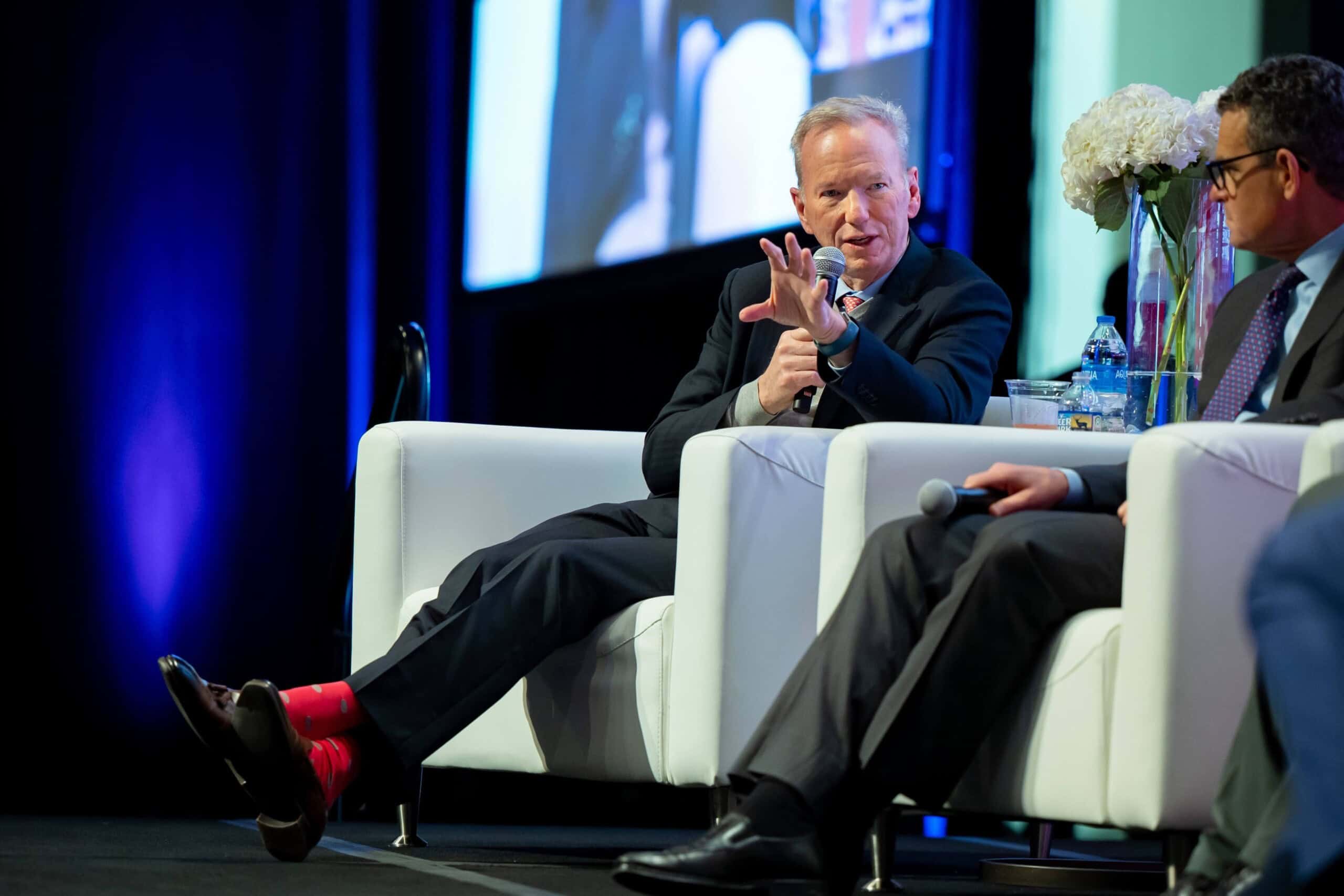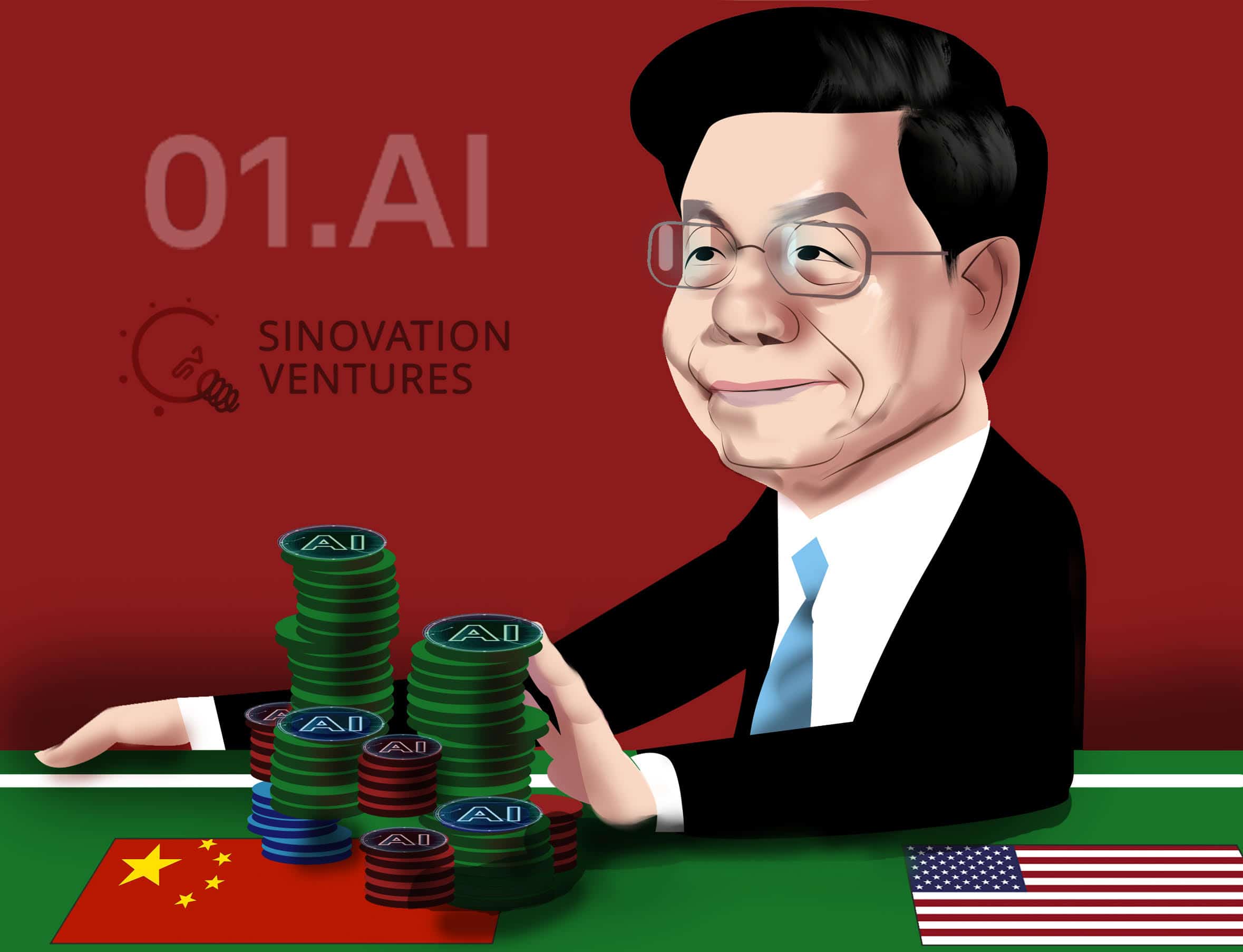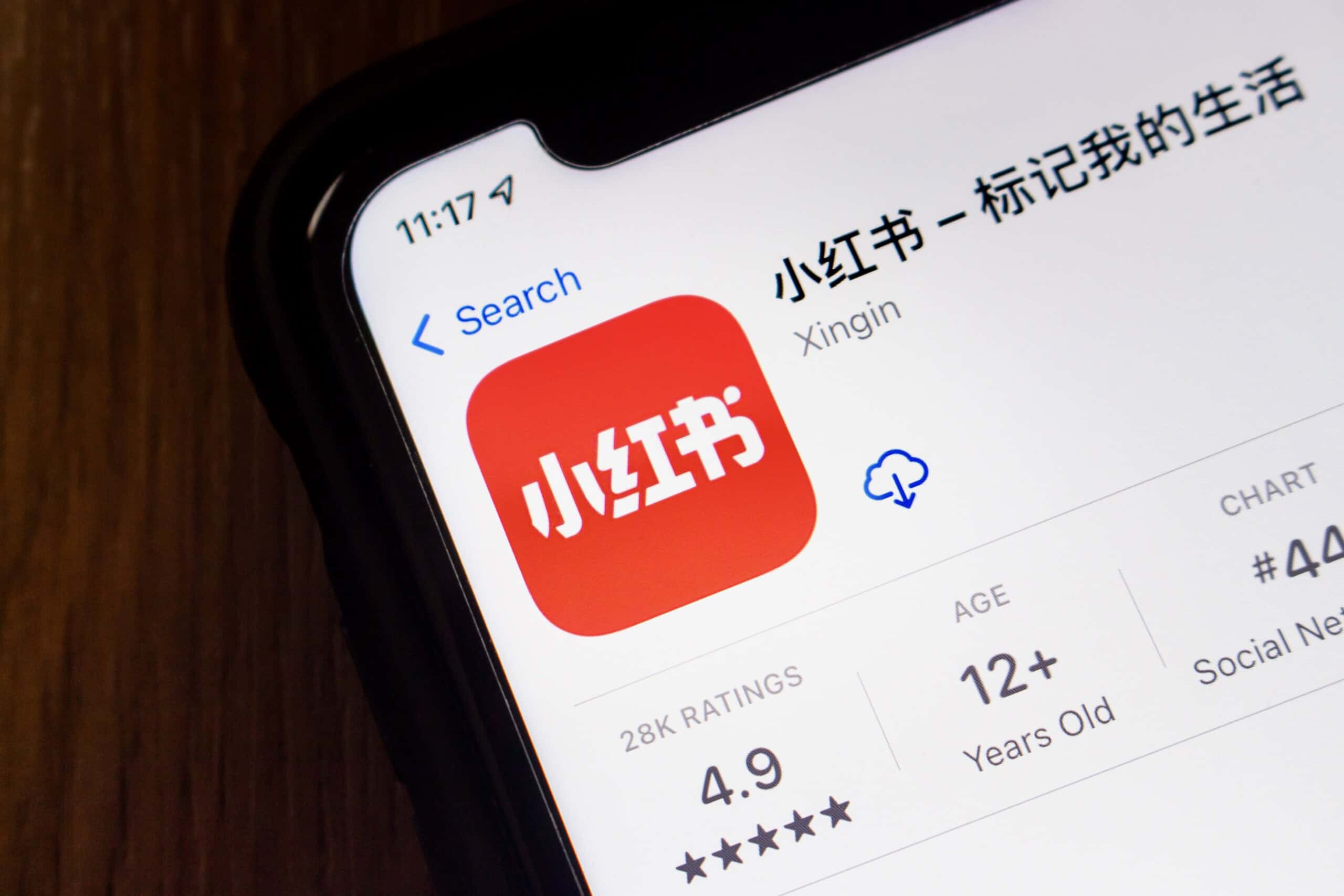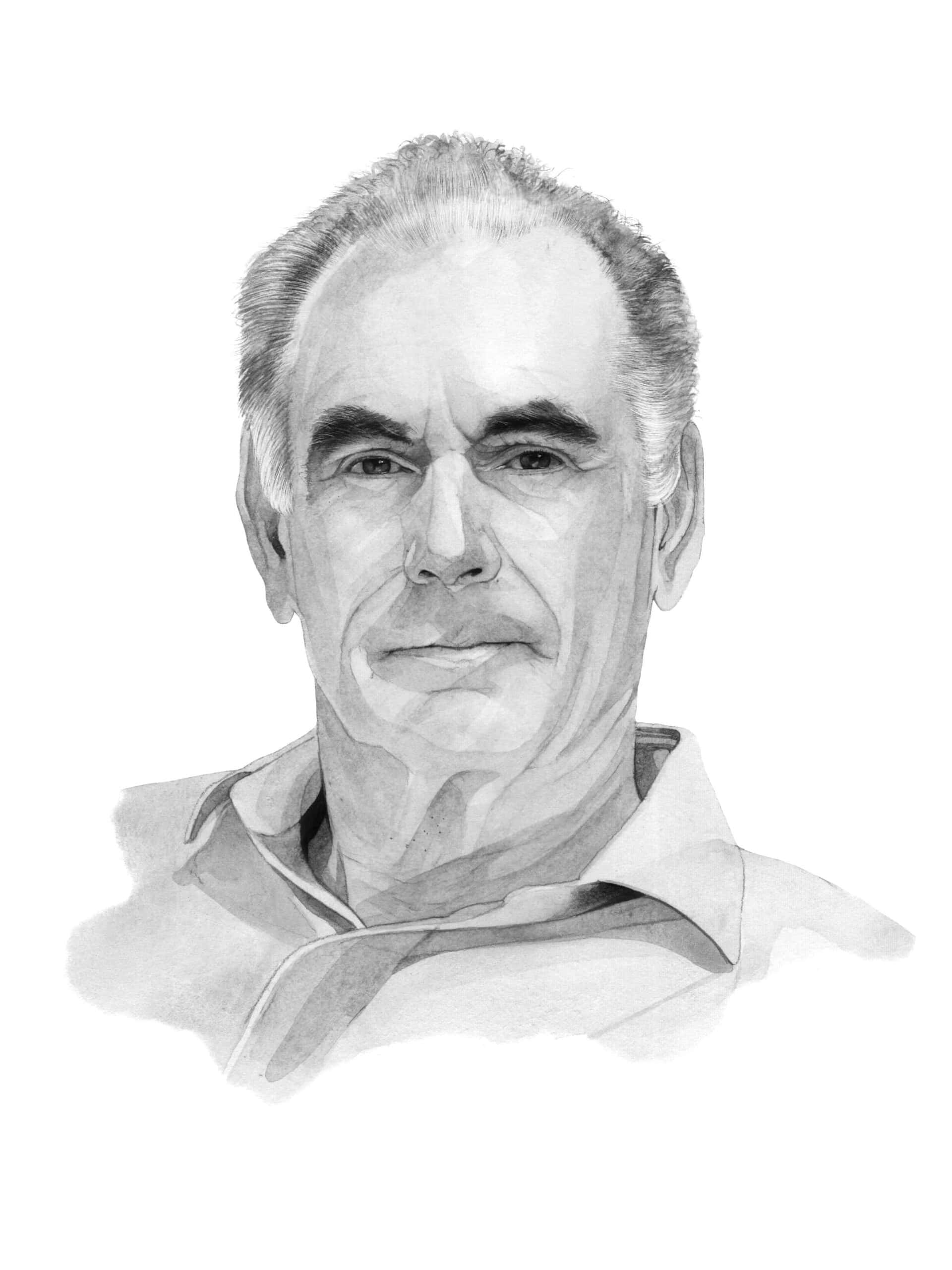
At the center of a cavernous exhibition hall, under a large sign with the tagline “To Empower Warfighters,” a former submarine officer in a patterned button-up shirt was showing off a screen displaying an alarming scenario in the waters around Taiwan’s Kinmen island.

In this demonstration for Gaia, a mapping platform developed by the U.S. big data firm Palantir Technologies, a hypothetical Chinese military ship could be seen moving towards Taiwanese waters, prompting U.S. Naval ships to approach and shepherd it out of the area. Soon after, another Chinese vessel marked as a fishing boat moved into a similar zone. In the simulation, Gaia used rapid artificial intelligence analysis of past fishing routes to identify that it was acting anomalously: further examination revealed the boat to be an undercover Chinese military ship.
If not for the platform, the Palantir employee explained, it would be difficult for the U.S. government to identify the second ship and de-escalate a similarly dangerous real-life situation in the Taiwan strait.
Palantir was just one firm flaunting its wares this week at the AI Expo for National Competitiveness, a major conference in downtown Washington, D.C. which drew thousands of attendees and a slew of big name speakers, including Biden administration officials like Jake Sullivan, the National Security Advisor, and Commerce Secretary Gina Raimondo, as well as executives from OpenAI and Nvidia.
The birth of Silicon Valley, in a sense, was military-civil fusion. But the difference here in the United States, [is that] it happened organically. The Chinese Communist Party is supercharging it with top-down directives.
Martijn Rasser, former Central Intelligence Agency (CIA) analyst and managing director of Datenna
The expo — organized by the Special Competitiveness Studies Project (SCSP), the brainchild of Eric Schmidt, Google’s former chief executive officer — was not explicitly about China. But the world’s second largest economy hung over almost every discussion, serving as the implicit competitor stimulating America’s AI advances.

With military leaders decked out in full regalia milling around alongside White House officials and Silicon Valley techies wearing company swag, the conference also embodied the American version of a much maligned Chinese policy: military-civil fusion. In fact, even as participants cited the close relationship between China’s private sector and military as the main rationale for keeping advanced AI technology out of its hands, many argued that the U.S.’s own technology industry must become better integrated with the government.
“We need to get a lot better at converting private innovations into hard power,” said Jacob Helberg, a Palantir advisor who has been a prominent advocate for banning the Chinese-owned app TikTok, during a Wednesday morning event.
“We don’t have civil-military [sic] fusion, we rely on a voluntary collaboration between the private sector and the public sector,” Helberg added. “We need to get better at taking our private innovations and converting them into the most advanced military and geostrategic capabilities out there.”

The idea of a military-industrial complex, of course, is nothing new in the U.S. — President Dwight D. Eisenhower first warned of its influence back in the early 1960s, while Silicon Valley was initially built with the help of Cold War defense spending. For people like Eisenhower, himself a storied World War Two leader, the danger was that government and defense companies might egg each other on to ever greater military spending, over-reacting to perceived threats and misallocating state resources.
Few such doubts were apparent among the political, defense and tech elites at this week’s expo. In fact, China’s rapid technological rise coupled with its deteriorating relationship with the U.S. has ushered in a new era where many in Washington and beyond are convinced the government must harness America’s current advantage in areas like AI for national security purposes.


Charles Quinton Brown Jr., current Chairman of the Joint Chiefs of Staff and the highest-ranking United States military officer, delivered a keynote address during a panel titled “Accelerate Change or Lose”, May 7, 2024. Credit: General CQ Brown, Jr.
“The birth of Silicon Valley, in a sense, was military-civil fusion,” says Martijn Rasser, a former Central Intelligence Agency (CIA) analyst who is now the managing director of Datenna, a techno-economic intelligence platform about China which had a booth at the expo. “But the difference here in the United States, [is that] it happened organically. The Chinese Communist Party is supercharging it with top-down directives. That was a big wake up call for the policymakers here in Washington and increasingly now allied capitals, and that’s what everyone here at this conference is reacting to ultimately.”

Schmidt, the former Google boss, has himself long advocated bridging the private and public sector to effectively compete with China. After stepping down as the CEO of Google — where a controversy broke out in 2018 when staffers protested the company’s work with the Pentagon — he became the inaugural chairman of the Defense Innovation Board (DIB), set up to help the military adopt emerging technologies, and was selected to lead an influential government AI commission. When the commission wrapped up, some of its staff moved over to SCSP, which has risen from nowhere to become a D.C. juggernaut over just three years.
One of Schmidt’s private sector investments, Rebellion Defense, which creates software for the defense community, had a booth at the front of the exhibition hall. Past it, many other firms making products including AI chips, autonomous EVs, supply chain mapping software, and rugged telecommunications devices displayed their innovations. A fusion energy firm called Tokamak Energy advertised images of a massive egg-like device which promises to revolutionize the global energy grid. Bret Boyd, an army veteran-turned-CEO explains how his firm, Sustainment, serves as “LinkedIn for manufacturers,” helping companies that have long relied on Chinese suppliers to find domestic alternatives.
I stuck up for the U.S. government when it wasn’t popular in Silicon Valley. The hopeful thing is that Silicon Valley has changed, partly because people realize you’re not going to make any money in China.
Alex Karp, CEO of Palantir Technologies
Several government branches were also represented, like the Department of Energy, the U.S. Space Force, and the Bureau of Industry and Security, the small office in the Commerce Department responsible for export controls.
On Tuesday morning, Schmidt appeared alongside former chairman of the Joint Chiefs of Staff Mark Milley, Alex Karp, Palantir’s CEO, and David Cohen, the CIA’s deputy director, for a panel on “The Future of Geopolitics and the Role of Innovation and Technology.”

Wearing a pink shirt and suit jacket beneath an unruly mop of curly hair, Karp stole the show, speaking decisively on everything from the recent Israel-focused campus protests to how China has “no tech scene.” He, too, weighed in on the subject of Silicon Valley’s relationship with Washington.
“I stuck up for the U.S. government when it wasn’t popular in Silicon Valley,” Karp said as he fidgeted in his armchair. “The hopeful thing is that Silicon Valley has changed, partly because people realize you’re not going to make any money in China.” One of Karp’s recent hires, according to recent reports, is Mike Gallagher, former congressman and chairman of the Select Committee on the CCP, who is set to burnish both the firm’s hawkish bona fides and its connections on Capitol Hill.

When Kurt Campbell, the deputy secretary of state, sat on the same stage the next morning, he stuck to his talking points about the administration’s “intense diplomacy” with Chinese counterparts, which has recently expanded to include discussions on AI.
At the Biden-Xi summit in November, the two leaders discussed bilateral AI talks, and Secretary of State Antony Blinken announced in a late April press conference that they will start in the coming weeks. The talks were much debated at the expo: Jake Sullivan, looking tired in a drab black suit, underscored the need to discuss the “transformational technology” with Chinese officials. Eric Rosenbach, a Harvard Kennedy School lecturer and former Defense Department official, was more skeptical. “The only reason the Chinese want to negotiate right now is to hold us back on AI,” he said. “There’s no other reason.”

Using AI to understand China was another common topic. At a panel dedicated to discussing open source intelligence, Randall Nixon, the director of Open Source Enterprise at the CIA, said the government is in the midst of an “OSINT renaissance”, and described the use of AI to sort through massive flows of data and information about countries like Russia and China.
“The second phase of this renaissance is the explosion of the private sector,” he said, citing the huge number of companies collecting various types of open source data. “I also sometimes call them capitalist patriots,” he added.
On Tuesday afternoon just after 3pm, a fire alarm went off, forcing both capitalist patriots and common attendees alike to evacuate onto the humid sidewalk, where they mingled with participants from the realtors convention being held downstairs. Just a few minutes later, staff announced it was a false alarm.
The crowd filed back through the doors to continue discussing another alarm ringing throughout Washington, which many expo attendees insist is not a drill: the technological rivalry with China.

Katrina Northrop is a former staff writer at The Wire China, and joined The Washington Post in August 2024. Her work has been published in The New York Times, The Atlantic, The Providence Journal, and SupChina. In 2023, Katrina won the SOPA Award for Young Journalists for a “standout and impactful body of investigative work on China’s economic influence.” @NorthropKatrina



